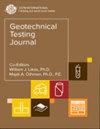Comparative Evaluation of the Long-Term Filtration Performance of Recycled Materials in Highway Drainage Systems
IF 1.2
4区 工程技术
Q3 ENGINEERING, GEOLOGICAL
引用次数: 0
Abstract
Highway drainage systems are designed to remove surface water and groundwater without deteriorating the road structure; hence, their durability is crucial to sustain the performance of highways. Filtration performance of a drainage system consisting of aggregate and geotextiles is one key parameter that needs to be carefully assessed so that clogging of the system does not result in failure. Substituting the natural aggregate in drainage systems with recycled materials would result in preservation of natural resources and employment of stockpiled recycled material, creating a mutually beneficial solution. In this study, the long-term filtration performance of three different recycled materials from different industries (i.e., two steel slag, recycled asphalt pavement, recycled concrete aggregate) has been investigated when used as filter material in drainage systems. Furthermore, two natural aggregate materials as control soils were used to compare the performance of recycled materials. A nonwoven geotextile with a low apparent opening size that represents the least favorable scenario in terms of clogging was selected as the filtration media. Long-term filtration experiments were carried out in the modified gradient ratio test setup and the hydraulic gradient ratio (GR) along with the permeability ratio (KR) were determined under different hydraulic gradients to evaluate the clogging performance. The results indicate that even under the most undesirable conditions, recycled materials exhibit a satisfactory filtration performance compared with natural aggregates, and they can be employed as aggregate material in highway drainage systems.公路排水系统中再生材料长期过滤性能的对比评价
公路排水系统的设计目的是去除地表水和地下水,而不破坏道路结构;因此,它们的耐久性对维持高速公路的性能至关重要。由骨料和土工布组成的排水系统的过滤性能是需要仔细评估的一个关键参数,以便系统堵塞不会导致故障。用回收物料取代排水系统中的天然集料,既可保存自然资源,又可利用储存的回收物料,从而创造一个互惠互利的解决方案。在本研究中,研究了来自不同行业的三种不同的再生材料(即二次钢渣、再生沥青路面、再生混凝土骨料)作为排水系统过滤材料的长期过滤性能。此外,采用两种天然骨料作为对照土,比较了再生材料的性能。选择了一种具有低表观开口尺寸的非织造土工布作为过滤介质,这代表了最不利的堵塞情况。在改进的梯度比试验装置上进行了长时间的过滤实验,测定了不同水力梯度下的水力梯度比(GR)和渗透率比(KR),以评价其堵塞性能。结果表明,即使在最不利的条件下,与天然集料相比,再生材料也表现出令人满意的过滤性能,可以作为公路排水系统的集料材料。
本文章由计算机程序翻译,如有差异,请以英文原文为准。
求助全文
约1分钟内获得全文
求助全文
来源期刊

Geotechnical Testing Journal
工程技术-地球科学综合
CiteScore
3.10
自引率
12.50%
发文量
53
审稿时长
3.6 months
期刊介绍:
The purpose of the Geotechnical Testing Journal is (1) to provide a high-quality publication that informs the profession of new developments in soil and rock testing and related fields; (2) to provide a forum for the exchange of information, particularly that which leads to the development of new test procedures; and (3) to stimulate active participation of the profession in the work of ASTM International Committee D18 on Soil and Rock and related information.
The editorial scope of this journal covers test methods for soil and rock, sampling, nomenclature, and practices relating to the determination of properties and behavior of soil and rock for engineering purposes, and for soil as a medium for plant growth.
 求助内容:
求助内容: 应助结果提醒方式:
应助结果提醒方式:


